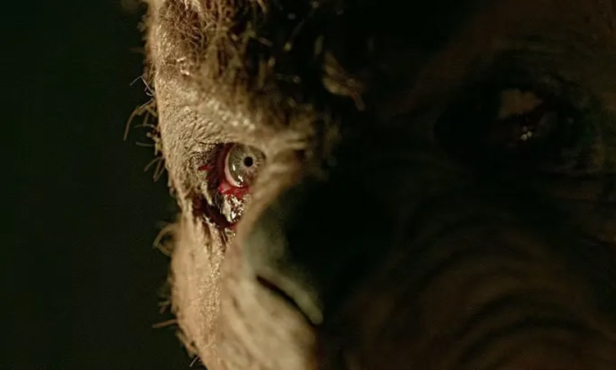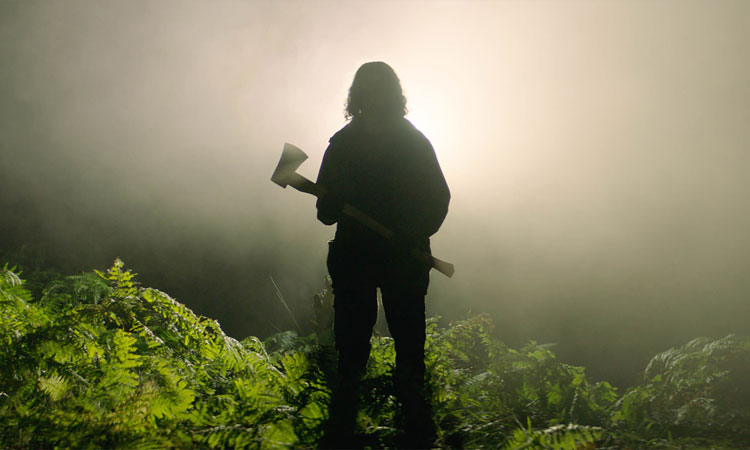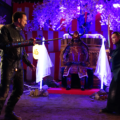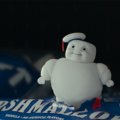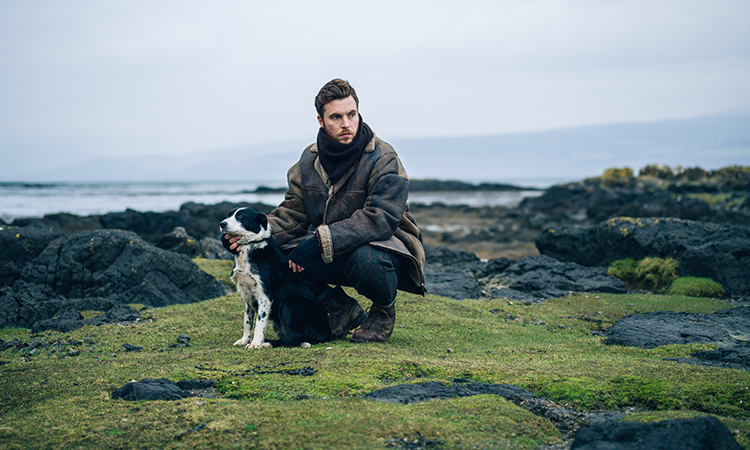In 2023, in the wake of the arrival into the public domain of A.A. Milne’s Winnie-the-Pooh stories (although not of the animated iconography which Disney added to its characters), writer/director/producer Rhys Frake-Waterfield, a filmmaker associated with the schlockier end of the DTV genre market, was quick to cash in with a horror-fied ripoff, Winnie-The-Pooh: Blood and Honey. This would take a beloved property lodged deep in the childhood consciousness, and toxify that nostalgia with some adult – or at least adolescent – motifs, much as Peter Jackson did with Meet The Feebles (1999), Brian Henson with The Happytime Murders (2018), Danishka Esterhazy with The Banana Splits Movie (2019) and Karl Holt with Benny Loves You (2019).
The concept was sound, and the IP was undeniably alluring – but the problem lay in the execution. For the bloody stamp that Winnie-The-Pooh: Blood and Honey would place on the children’s stories followed the entirely unimaginative template of a bog-standard Eighties-style T&A slasher. It would be all too easy to blame the low budget for the film’s considerable failings, but that would be to discredit every much better genre film made for far less.
Rather the root of the issue was the uninspired screenplay, full of at best perfunctory lines that the cast simply could not bring to life, so that it felt exactly like what it was: a rushed cash-in designed to let Jagged Edge Productions be first to get their muddy paws on a potential franchise of ‘Twisted Childhood Universe’ films (now painfully redubbed the Poohniverse). And it worked – for while Frake-Waterfield’s film was hardly a critical success, the premise alone, encapsulated in its title, proved enough to attract viewers, bringing in a massive return on investment.
The good news is that the inevitable sequel has learnt from the mistakes of its predecessor. Frake-Waterfield still directs, but has handed over the writing duties to Matt Leslie (Summer of 84, 2018), and so is able to deploy his considerably expanded budget on a much more nuanced story, without ever sacrificing the original’s appealing ludicrousness.
It opens with text: “You can’t stay in your corner of the forest waiting for others to come to you. You have to go to them sometimes”. While suitably menacing in the context of the film, and accurately promising the monsters’ direct move from the 100 Acre Wood to the nearby town of Ashford, this is also a genuine line taken from Milne’s Pooh, its innocence now lost in keeping with this series’ overall strategy of sullying childhood memory. As in the first film, there is a narrated storybook-style animated intro that lays out the strange mirror-image bond between the murderous mutant bear and his childhood friend Christopher Robin, and then we are off, as the killer creatures launch a vengeful attack on the neighbouring townsfolk who have been burning down their woodland home – although their revenge has deeper roots than recent forest fires and environmental encroachment.
Chris(topher) Robin (Scott Chambers, replacing the original’s Nikolai Leon) has his own traumas to deal with: not just being the sole survivor of last year’s slaughter, but partial, fragmented memories of a childhood spent playing with the younger Pooh (Peter DeSouza-Feighoney), and before that the loss of his own brother Billy who, along with six other children, mysteriously disappeared in 2003, with their case remaining unsolved to this day.
Chris is a mess, popping pills and undergoing hypnotherapy to recover his lost memories – and half of Ashford’s folk do not believe his tales of monsters in the woods and suspect that he himself was responsible for the massacre. In these newly psychologised terrains, the viewer may harbour similar suspicions, and understand why the police are quick to ask Chris for his whereabouts on the previous night when three caravanning women were horrifically dismembered. Yet the whole town is about to realise the truth behind Chris’ stories, or at least to share in his disturbed fantasies. Even his little sister Ella (Thea Evans), who prefers to go by the animalistic name ‘Bunny’, likes to use scissors and stitches to mutate her stuffed toys into hideously creepy hybrids, in what is a reflex for how the woodland creatures themselves came into being. Madness seems to run in the Robin family’s genetic code, shared by its siblings.
Yet the creatures – Pooh (Ryan Oliva), Piglet (Eddy Mckenzie), and, as their own copyright also lifts, also the more talkative Tigger (Lewis Santer) and winged Owl (Marcus Massey) – certainly appear to be flesh and blood. In finding out what and who exactly they are, Chris must also uncover his own repressed memories, and determine, with helpful exposition from the hospital janitor Cavendish (Simon Callow), just how they came to be in the first place.
Accordingly Winnie-the-Pooh: Blood and Honey 2 is a quest for origins, both narrative and genetic, allowing for a Frankenstein-like mad scientist storyline to be spliced into the inherited slasher material.
The latter too is respectful of the subgenre’s history, with the dungaree’d Pooh at times menacing a babysitter as though it were Halloween, while adopting the favoured weapons from The Driller Killer, Saw and The Texas Chain Saw Massacre when he is not using a nailed club, a foothold trap, or his bare bear hands. Owl, swooping vampirically, can vomit acid like an Alien xenopmorph, and bouncy Tigger clears underground dance floors like Blade.
Meanwhile Chris’ babysitter friend Lexy (Tallulah Evans) catches her young horror-loving ward Freddie (Flynn Gray) – who is named for, and dressed like, the slasher villain from the Nightmare on Elm Street series – watching on television a cheapo cash-in movie based on Chris’ account of the massacre and titled, in a postmodern flourish, Honey and Blood: The Christopher Robin Story. We are in a hall of mirrors and truly through the looking-glass here – there is even an early victim named Alice (Tosin Thompson) – as Pooh’s implacable rage, matching the resentments and indignations of persecuted pariah Chris, is visited upon all the young doctor’s friends and family.
All of which is to say that this is a layered affair, part self-referential psychodrama, part baroque slice-and-dice, part family movie, part twisted origin story, part giallo-lit nightmare in a damaged brain, without ever forgetting its connection to Milne (whose surname serves in the film as the brand label for a Google-like online search engine) and to his story world, however distorted here (there is even a perverted version of ‘Pooh Sticks’).
Winnie-the-Pooh: Blood and Honey 2 is grotesque and portentous and silly – but with just the right balance of po-faced seriousness and ironic self-awareness to get away with its own inherent absurdities. It is a considerable improvement on the original film, with lost, damaged childhood always lying at its very heart, and trauma never truly dead and buried.
Winnie The Pooh: Blood And Honey 2 is released in UK cinemas on 26 March.
